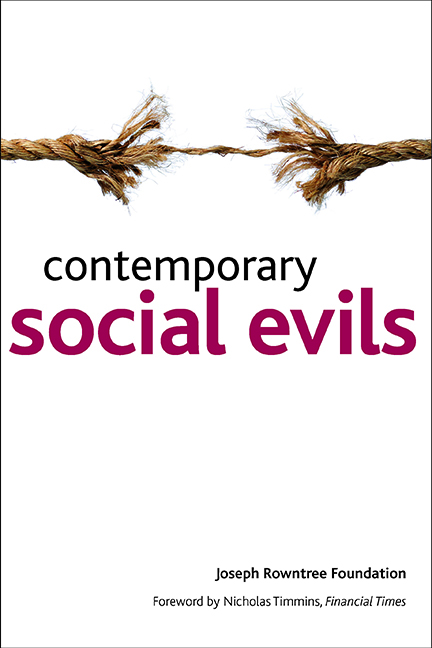Book contents
- Frontmatter
- Contents
- Foreword
- Acknowledgements
- Notes on contributors
- 1 Introduction
- 2 ‘Social evils’ and ‘social problems’ in Britain since 1904
- Section 1 Public Voices
- Section 2 Viewpoints
- A decline of values
- Distrust
- The absence of society
- Individualism
- Inequality
- Section 3 Reflections
- Appendix: How the ‘social evils’ consultations were organised
- Index
3 - Uneasy and powerless: views from the online consultation
Published online by Cambridge University Press: 26 January 2022
- Frontmatter
- Contents
- Foreword
- Acknowledgements
- Notes on contributors
- 1 Introduction
- 2 ‘Social evils’ and ‘social problems’ in Britain since 1904
- Section 1 Public Voices
- Section 2 Viewpoints
- A decline of values
- Distrust
- The absence of society
- Individualism
- Inequality
- Section 3 Reflections
- Appendix: How the ‘social evils’ consultations were organised
- Index
Summary
The 3,500 people who took part in the Joseph Rowntree Foundation's online consultation left no doubt that the concept of ‘social evil’ is one that resonates in modern Britain. It aimed to reach out and get as many diverse views as possible. The richness of the responses, as well as their volume, was impressive. Although, unsurprisingly, this was unlikely to be a representative sample of the British people, it was clear that the vast majority of those who took part in the online exercise had embraced the opportunity to consider the nature of contemporary society with care as well as enthusiasm.
The consultation exercise tapped into issues about which people cared deeply. Participants not only fulfilled the request made for them to prioritise three contemporary social evils each, but also expressed strong views about their causes, their consequences and (more rarely) their potential remedies. The end result was, itself, a web: framed by intertwined and overlapping issues, but also characterised by irreconcilable, conflicting views on a number of key issues.
There was never any expectation that a simple list of social evils would emerge; nor did it. The term ‘social evil’ was, occasionally, a source of controversy, with fears raised by some respondents that it would prompt and encourage crude, ‘black and white’ responses to complex social issues. Others, not unreasonably, felt uncomfortable concentrating on problems without acknowledging some positive aspects of contemporary living. There could, nevertheless, be no question about the depth of concern expressed, around a series of recurring themes. Cumulatively, these were seen to reflect an overriding sense of unease at the trends currently shaping society. They also revealed deep feelings of frustration and individual powerlessness to alter their direction.
Dominant themes
A number of themes stood out in the analysis of responses:
• individualism, declining community and greed;
• misuse of drugs and alcohol;
• declining values;
• social virtues;
• family breakdown and poor parenting;
• inequality and poverty;
• apathy, failed institutions and a democratic deficit.
Individualism, declining community and greed
Many respondents revealed a deep loathing of what one described as the “me, me, me society”. It was suggested that people today “see themselves only as individuals and not as part of a wider society” and that this individualism has been a root cause of many other social problems.
- Type
- Chapter
- Information
- Contemporary Social Evils , pp. 27 - 50Publisher: Bristol University PressPrint publication year: 2009



